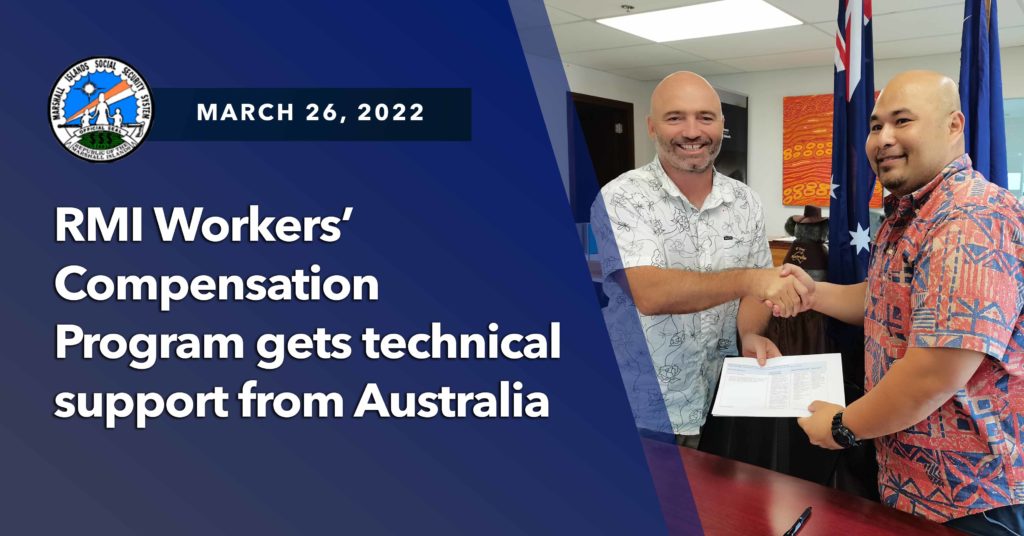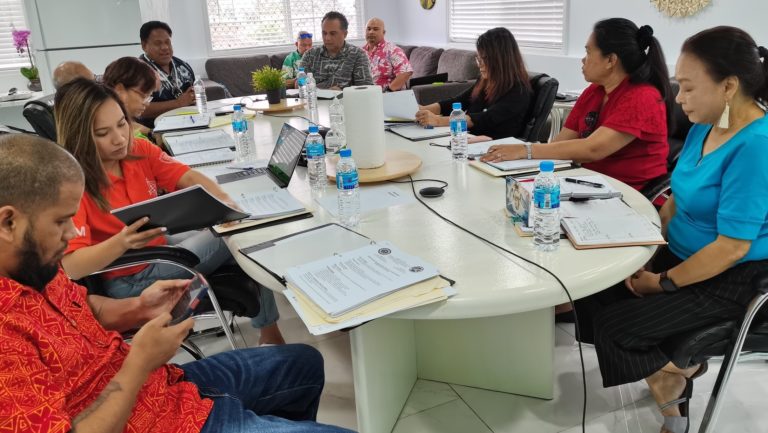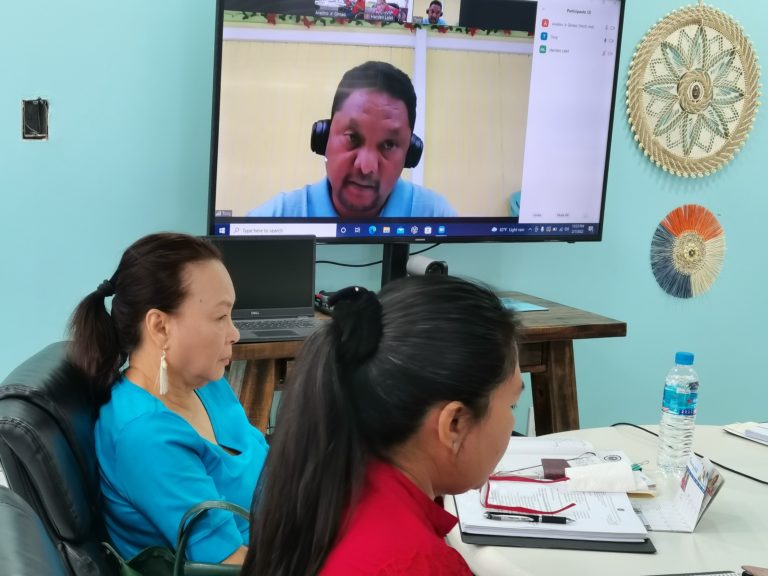Published 26 March 2022
RMI Workers’ Compensation Program gets technical support from Australia

On March 21, 2022, Australian Ambassador Brek Bratley and MISSA’s Acting Administrator Bryan Edejer have signed the terms of reference for the Australian workers’ compensation adviser who is being provided by the Australian Government at no cost to MISSA. The Adviser will assist the Administration and the Workers’ Compensation Task Force (WCTF) in the preparation and smooth implementation of the country’s Workers’ Compensation Program to be implemented starting September 30, 2022. The Administration deeply recognizes this invaluable assistance from the Australian Government which would have not been made possible without the support and backing of former Attorney General Richard Hickson, who is also an Australian himself.

The original Workers’ Compensation Bill was introduced by then Minister John Silk in 2012 under Bill No. 19. Most of the provisions and procedures were patterned after the CNMI Workers’ Compensation Program. But due to some mixed reactions from employers who are concerned with the affordability and practicability of the program, the bill was amended and reintroduced by Min. Silk in 20 16. However, it was only passed by the Nitijela on September 20, 2019 which then became P.L. 2019-107. The purpose of the law is to provide compensation and rehabilitation of workers in respect to work-related injuries resulting to disability or death. The designated administrator of this program is the Marshall Islands Social Security Administration (MISSA).
To give employers, workers, insurance companies and other stake-holders ample time to understand the program and allow MISSA to design its structure and establish its systems and procedures, its implementation was deferred by the Cabinet until September 2021.
Considering the scope of MISSA’s responsibility as its administrator and the current COVID-19 situation worldwide, the Administration requested that it be given at least one year to come up with a compensation program that would address several areas of concern that were not clarified to MISSA when the law was passed. Consequently, the Cabinet postponed again its implementation date to September 30, 2022.

The main highlights of the workers’ compensation program follow:
- The law is COMPULSORY. It requires every employer, including the private sector and state-owned enterprises to secure payment with insurance carriers, while the Government Workers will have the RMI Government Self-Insurance Fund which will be established to secure public employees workers’ compensation.
- Coverage
- Death benefits for workers who were fatally injured during the performance of their work.
- Disability (temporary and permanent) benefits due to injuries while at work.
- Medical/hospitalization benefits arising from injuries/accidents during work.
- Maximum coverage for disability or death is $40,000
- Two Funds shall be established:
- Special Disability Fund, to cover private workers:
Payments into the Fund shall be made as follows:- Each employer shall contribute $10,000 for the death of an employee resulting from injury where the Administrator determines that there is no person entitled to MISSA’s disability benefits for such death
- Each insurer providing security for payment of workers’ compensation claims shall annually pay 2% of the total premium paid for such security during the preceding year.
- All amounts collected as fines and penalties under the program’s provisions.
- RMI Government Self-Insurance Fund
- To be appropriated from the General Fund for Government employees, including government agencies and public corporations.
- The Secretary of Finance shall be the custodian of this Fund.
- Special Disability Fund, to cover private workers:
In preparation for the implementation of the program, MISSA management started with a consultative meeting in June 2021 with Commissioner Frank Cabrera, the head of CNMI’ Workers’ Compensation Commission. This was followed by a meeting with the two local insurance carriers in the country (Moylan’s and Marshall Insurance Agency) and then with Majuro Chamber of Commerce together major businesses/employers in Majuro.
On October 7, 2021, upon the recommendation of the MISSA Board (also designated as the Workers’ Compensation Board), the Cabinet approved the establishment of an 11-member Workers’ Compensation Task Force comprised of the following members:
- Mark Stege, Chairman, representing Majuro Chamber of Commerce
- Bryan Edejer, Vice-Chairman, representing MISSA
- Senator Jack Adding, representing the Nitijela
- Daisy Alik-Momotaro, representing Civil Society/NGO
- Harden Lelet, representing Ebeye Chamber of Commerce
- Grace Abong, representing Moylan’s Insurance
- Corazon Lagunay, representing Marshalls Insurance Agency
- Malie Tarbwilin, representing the Government
- Travis, representing the Labor Office
- Teresa White, representing the self-employed sector
- KalGov Councilman Anthony Maika, representing Kwajalein/Ebeye

The WCTF’s primary role is to oversee the preparation and pre-implementation phase of the program and will have the following functions and responsibilities:
- Review P.L. 2019-107 (Workers’ Compensation Law;
- Identify issues and provisions that may not be applicable, not practicable or not realistic to enforce in the Marshall Islands.
- Determine the affordability and probability of compliance to the financial provisions of the law.
- Provide the right, detailed and more understandable interpretation of provisions that are generalized and may be subject to different interpretations.
- Review the draft of Workers’ Compensation Handbook and Forms to be used;
- Ensure that the provisions and procedures in the Handbook are in compliance and aligned with the Workers’ Compensation Law.
- Check if the forms to be used are consistent and aligned with the Handbook in terms of contents, deadlines and requirements.
- Make changes and revisions as necessary.
- Consult with and solicit comments and recommendations (by in-person meetings, virtual communication and public forums) from the Workers’ Compensation Board, MISSA management, Nitijela, Cabinet, AG’s Office, heads of government agencies, Chamber of Commerce, selected employer and employee groups, Australian Consultant and the general public.
- Gather data, comments and recommendations resulting from the consultations; and
- Present a report to the Cabinet with the following highlights:
- What were done and accomplished by the task Force;
- Results of consultations and recommendations;
- Proposed amendments to the Workers’ Compensation Law
- Present and justify/defend the proposed amendments to the Nitijela during the hearing.
- Continue to work hand-in-hand with the Workers’ Compensation Board and MISSA management during the initial year and post-implementation period of the program, and make changes to the system and procedures when deemed practicable, legal and necessary.
To-date, the WCTF has convened five times already and will continue to meet at least twice a month until the program kicks off on September 30, 2022. In every meeting, MISSA is represented by its executive committee comprised of Saane K. Aho, Ave Gimao Jr. and Bill Joseph.
One of the main highlights of the Task Force’s timeline of activities is a series of consultative meetings with stakeholders that include major businesses in Majuro and Ebeye, PSC and representatives from different ministries, retailers and wholesalers, fishing and utility companies, self-employed workers like taxi drivers and small entrepreneurs.